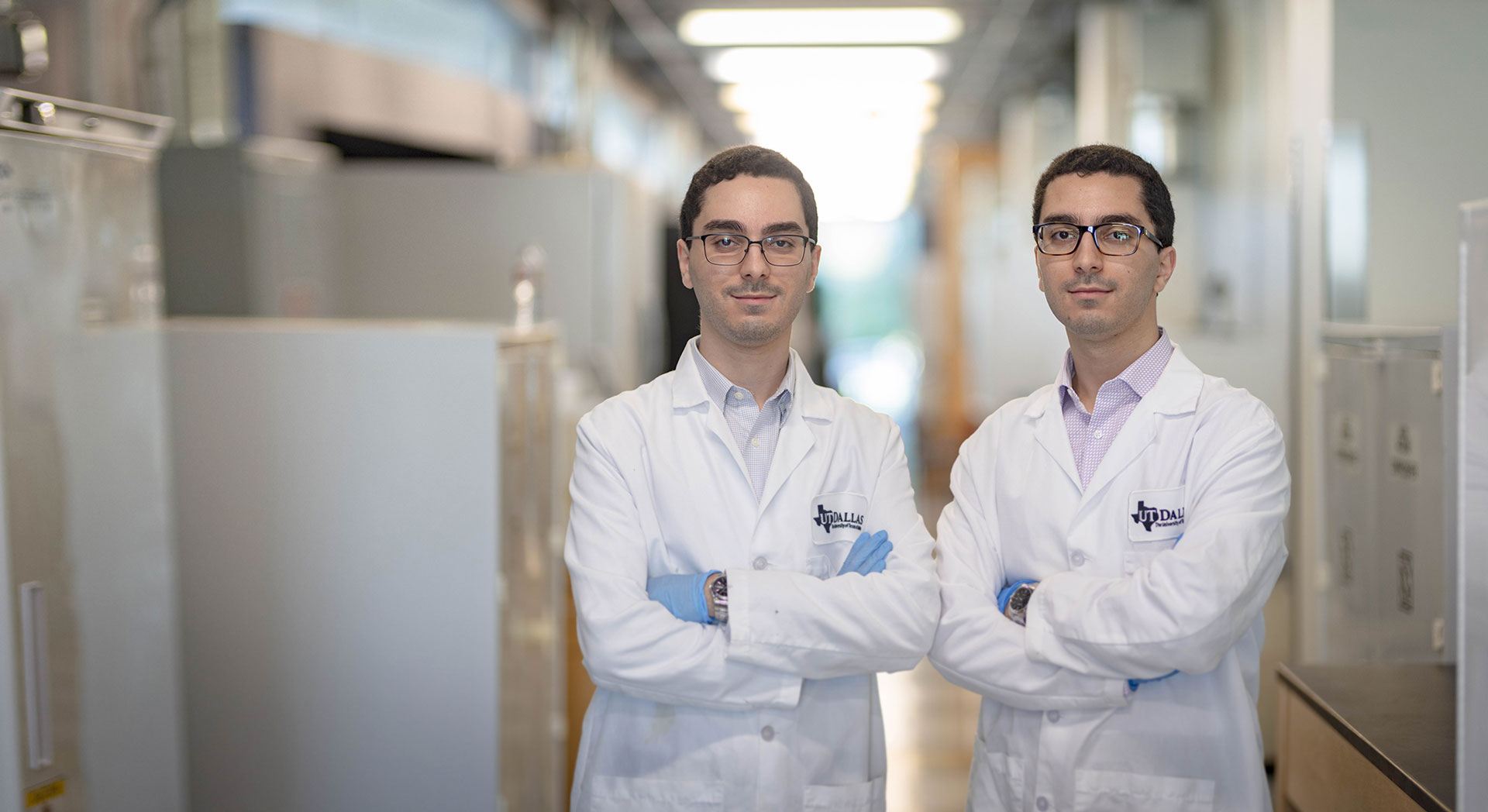
Parsa and Pouya Modareszadeh, twin brothers with twin interests in biology, always planned to go to medical school.
But those plans will have to wait. The duo at The University of Texas at Dallas are entrepreneurs in a new biotech company started with their mentor, Dr. Li Zhang.
As first-year students in 2019, they were flattered when Zhang, professor of biological sciences in the School of Natural Sciences and Mathematics and holder of a Cecil H. and Ida Green Distinguished Chair in Systems Biology Science, approached them about starting a biotech company.
“Initially, we said, ‘No,’” Pouya said. “We thought her research was really interesting, but we didn’t think we would be the right people for this, being undergraduates and not being anywhere remotely near the business world.”
After more thought, though, they changed their minds.
“Biotech is a great place to be when you want to intersect science and medicine and business,” Pouya said.
Zhang and the brothers founded HemePro Therapeutics in November 2020. Pouya (pictured right) is the CEO; Parsa (left) is the chief operating officer; Zhang is the chief scientific officer. HemePro is in the process of licensing Zhang’s patented research on heme-sequestering proteins and peptides and is developing it into a therapy to treat many types of cancer, while leaving healthy cells largely unaffected. The goal is to turn heme-sequestering proteins into cancer-fighting drugs.
The twins’ rise from students to biotech executives began when Parsa, a UT Dallas Academic Excellence Scholar, and Pouya, a National Merit Scholar, both joined Zhang’s lab the summer before their freshman year.
Zhang’s research on heme, the oxygen-binding molecule in hemoglobin, has been supported by grants from the National Institutes of Health and the Cancer Prevention & Research Institute of Texas.
Pandemic Push
The catalyst for the creation of the company got a nudge from the COVID-19 pandemic.
“Once COVID-19 happened, we were left with a lot of free time, so we put a lot of it into research,” Pouya said. “We read a lot of different publications, including Dr. Zhang’s book on heme biology, and we started our own project, where we explored the different pathways heme had for different diseases.
“Dr. Zhang saw potential in us, and she approached us and said, ‘I have this technology, and UTD has been helping me get a patent on it. Why don’t we start a company?’”
The initial phase of COVID-19, Zhang agreed, was a pivotal time in the company’s inception.
“During the pandemic, particularly in the early days, we had limited access to the lab, but we had more frequent lab meetings to discuss our research,” she said. “During that time, Parsa and Pouya enthusiastically participated by researching literature, proposing new ideas and making presentations in lab meetings.”
Zhang had no qualms about partnering with the undergraduates to develop and market her research.
“Their intense intellectual curiosity, enthusiasm, energy and motivation are so impressive,” she said.
“Although they are still undergraduates, I feel that they have great potential in entrepreneurship; after all, quite a few of the founders of large tech companies were college dropouts.”
While Parsa and Pouya are no college dropouts, they said it has not been easy running a startup biotech company while being students.
“It has definitely been a bit of a struggle,” Parsa said. “There have been semesters where we’ve taken 18 or 21 credit hours along with running the company, and it’s definitely something we’ve had to balance. But the potential impact that we could have on people’s lives drives us forward.”
They have overcome their lack of business acumen by tapping into UTD’s powerful mentorship network, including the Institute for Innovation and Entrepreneurship, which supports the launch of new businesses.
Their efforts have gained external attention. Pouya received a 2022 Future Texas Business Legend Award from the Texas Business Hall of Fame Foundation. HemePro also was selected in 2022 to participate in MassChallenge’s U.S. Early-Stage Program, which helps high-impact, high-potential startups grow their business.
Opportunities2
The unique research opportunities UTD offers its undergraduate students cemented the twins’ college choice.
“We have friends who have gone off to big research institutions and Ivy League schools, and while those universities are really great, they often don’t give undergrads the same opportunities to perform independent research early in their education that UT Dallas does,” Pouya said.
Thanks in part to his undergraduate research experience, Parsa was one of four UT Dallas students to earn a 2022 Barry Goldwater Scholarship and Excellence in Education Foundation award, which recognizes the nation’s most talented undergraduates majoring in science, engineering or math.
For the brothers, who graduated in fall 2022, the next step is working toward Food and Drug Administration approval to begin clinical trials. With backing from MassChallenge, they will start that work from their new office in BioLabs at Pegasus Park, the premier incubator space for North Texas biotech and life-science startups located near UT Southwestern Medical Center.
– Jessica Good
“Biotech is a great place to be when you want to intersect science and medicine and business.”
Pouya Modareszadeh BS’22



